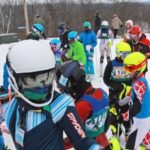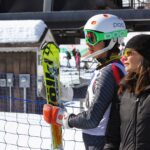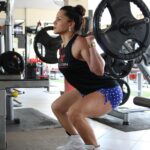The race season is finally over. After a long and demanding winter, you’re probably tired of skiing (regardless of whether the season was a triumph or a disappointment). It’s time to hang up your skis, pack away your gear, kick back, relax, and forget about ski racing for a few months, right? WRONG!!!
Being the best ski racer you can be is not a part-time activity. It requires a year-round commitment and consistent effort in your physical, technical, tactical, and, yes, mental training. If you’re a ski racer serious about achieving your competitive goals, the end of the race season simply means it’s time to start your preparations for next season. After a short period of rest and relaxation, say, a week or two, you need to begin your planning and your training that will get you ready to continue your progress toward your goals next winter.
Evaluate This Past Season
The first thing you want to do is to look back on the recently completed race season and evaluate how you did. Here are several questions to ask yourself (and your coaches):
- Did you improve physically, technically, tactically, and mentally?
- Did you achieve the results you wanted?
- Did you make progress toward your long-term goals?
- What did you do well?
- What areas do you need to improve on?
With these questions answered, you can, in collaboration with your coaches, decide what in your training worked and what did not. You can then, again with your coaches, use this information to create an off-season training program to build on your strengths and alleviate your weaknesses.
It’s About Preparation
How you ski next year depends on what you do this spring, summer, and fall. The physical conditioning gains you make and the technical, tactical, and mental skills you develop in the off-season will determine how much you improve and whether you reach your competitive goals next winter. There are three areas in which you must focus to maximize your preparation.
First, Commit to an intensive physical conditioning program. Ski racing has become a sport of “beef,” meaning you need muscle, strength, and power (plus, of course, agility and quickness). The only way to develop these areas is with an organized fitness program that may involve weight training, plyometrics, speed work, and stretching.
Second, most racers spend at least part of the summer and fall on-snow. Summer and fall skiing is essential for your technical and tactical development because you’re able to focus exclusively on improvements in your skiing fundamentals without the pressures of getting ready for races. It also enables you to test and adapt to new equipment (though my motto is: “If it ain’t broke, don’t fix it,” meaning if your equipment works for you, don’t mess with it. Testing distracts you from training and can cause you to question which equipment is best for you).
Finally, and just as importantly, the off-season is the best time to engage in mental training. Just like physical conditioning and technical skills, mental aspects of ski racing (e.g., confidence, intensity, and focus) take time and effort to develop. An organized program of mental training can have huge benefits when you enter the new race season.
Goal Setting
To help you figure out how to work on all of these areas, write down your goals for next season. The first goal you should look at is your long-term goal, that is, what you ultimately want to accomplish in your ski racing. Ask yourself whether that “dream” goal needs to be changed (upward or downward) or you are still on track for it. Next, set a seasonal goal for what you want to accomplish next winter in terms of results, rankings, etc.
Then, using the information you gained from your evaluation of last year and feedback from your coaches, set specific goals for your physical conditioning, technical and tactical development, and mental training to achieve those goals. These goals should be specific (e.g., amount of weight lifted, frequency of workouts) and structured into a weekly training plan. The idea is that every day when you get up, you know exactly what you need to do that day to progress toward your goals.
Mental Skills
The off season is the ideal time to work on the mental of your ski racing. Ask yourself whether your motivation, confidence, intensity, focus, and emotions helped or hurt your ski racing this past winter. Also, consider how prepared you are to get the most out of your training. And if you’re not engaged in a regular mental imagery program, you’re just not doing everything you can to achieve your ski racing goals.
Motivation. Your ability to commit to the goals that you set will depend on how motivated you are to put in the hard work, even when you’re tired, bored, or wanting to do things that are much more fun. If you have trouble motivating yourself, there are several things you can do.
Develop an organized weekly training program to help you build your training into your daily activities. If you have a plan, you’re more likely to stick to it. Also, find a training partner to work out with; you’ll be less likely to skip workouts when you feel unmotivated because your partner will be counting on you and you’ll work harder because someone is pushing you to do that extra rep, set, or drill. And post reminders where you can see them of your biggest competitors (“Am I working harder than them?”), racers whom you admire, or inspirational quotes that fire you up.
Confidence. A major purpose of off-season training is to build confidence. Think of it as putting money in the bank: The more confidence “money” you deposit now, the bigger confidence “checks” you’ll be able to write next winter (and, unlike with bank checks, you can’t write checks that you can’t cash in ski racing). If you’re working hard and improving during the off-season, when the winter begins, you’ll have the confidence that you have done everything possible to ski your best and achieve your goals. See my earlier article about confidence on specific strategies you can use to build your confidence.
Intensity and focus. An important off-season goal for you is to identify and learn to control your intensity (e.g., get fired up or calmed down) and focus (e.g., avoid distractions). You can work on developing your intensity and focus skills during both physical conditioning and on-snow training.
Mental imagery. Mental imagery is perhaps the most powerful tool you can use in your mental training during the off-season (I’ll be addressing mental imagery in my final article next week). Mental imagery, which involves regularly imagining yourself in different training and race situations, is like weight training for the mind, it can strengthen your technical, tactical, competitive, performance, and mental “muscles.”
Mental imagery can develop all of the different mental areas that impact your training and racing. Mental imagery increases motivation because you see yourself skiing well and reaching your goals. It builds confidence because you’re seeing yourself succeed and ingraining the images and feelings of skiing your best. You improve your intensity and focus because you’re creating actual race scenarios in your mind that require your body to get its ideal intensity and your mind to get focused.
Mental imagery can also help your technical and tactical development. Considerable research has shown that if you combine physical and mental practice, you will improve more than just with physical practice alone. As you imagine yourself racing, you can incorporate technical and tactical changes into your skiing that will translate into your actual on-snow skiing.
Getting Going
Getting going for next season starts with that first step of deciding how important ski racing is to you. Here are some questions to ask yourself:
- How big are your ski racing goals for next season?
- How hard are your competitors going to be working in the off-season?
- How badly do you want it?!?!
The key to achieving your goals next winter is to start now! Talk is cheap. It’s easy to say you want to be a great ski racer; it’s an entirely different thing to actually do the work necessary. If your goals are at all high, the only chance you will have is to commit to an intensive off-season physical, on-snow, and mental training program. Your goal when you get in the starting gate of your first race next season is to be able to say: “I’m as prepared as I can be to achieve my goals.” And, with all of that hard work in the off-season that you “deposited in the bank,” the chances are you will be successful and reach your goals.
Note: I received many emails and calls during the winter from parents and junior programs about working with their athletes. My response was that the race season is not the time to focus on mental preparation. But, as my article above suggests, now is the time. If I can be of any help in the coming off season to racers, parents, or clubs, please feel free to contact me (jim@drjimtaylor.com; 415-322-8425).





